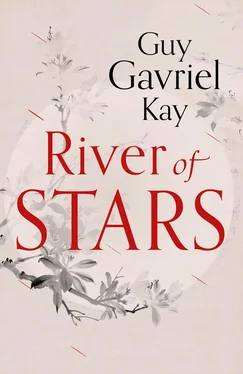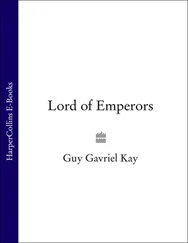“This man, this … gardener has done so,” Wenzong said.
Dejin could see the emperor’s agitation, a hand moving up and down an ivory column, stroking it steadily.
“And your serene excellence permits him to live? This is yet another indication of the emperor’s benevolent—”
“No. Listen to us.”
The emperor had just interrupted him. It was astonishing. Hang Dejin folded his hands in his sleeves and lowered his head. And then, listening, he understood, and the prime minister of Kitai saw, as a shaft of sunlight slicing down through storm clouds, opportunity shining.
He had summoned the gardener into his presence, the emperor said, because of the distressing sound of his weeping. Inquiring directly, he had learned that the labourer’s tears were for his son, who had just been reported dead. The son, it seemed, had been in the Pacification Army, among the recruits sent against the Kislik capital in the northwest.
The gardener had just told him, the emperor said, what all of Hanjin apparently knew: that half the Kitan army had been destroyed some time ago, on a retreat from Erighaya. It seemed that they had been deficiently led and supplied.
Hang Dejin privately considered it remarkable (and very wrong) that the gardener was still alive, after speaking so many words to his emperor. It was unbearably presumptuous, deserving decapitation. Where had the world come, if garden servants could behave this way? At the same time, he felt a surge of warm feelings towards the man lying face down on the ground, sweating through his tunic. Sometimes it happened that you received aid, illumination, from the most unexpected sources.
“We have just had the leader of our guards here to confirm this disturbing information,” the emperor said.
Wenzong’s voice was thin, cold. He really was very angry. The guards stared straight ahead, still alert to the presence of the gardener. Dejin wasn’t sure which was their leader, the uniforms were identical. The faces even looked alike to his weak eyes. Wenzong preferred that in his guards, for the harmony.
It appeared that the leader—whichever one it was—had indeed echoed the story told by the gardener. It was not a new tale. The first word of disaster had reached Hanjin last year. Even servants had heard it by now.
The emperor had not.
Hang Dejin said, carefully, “My lord, it is a lamentable truth that the Pacification Army suffered terrible losses.”
The emperor of Kitai stared bleakly down at him. The emperor was a tall man and was standing three steps up, in the pavilion. His writing seat and desk were behind him. The rock-mountain that had destroyed fields and killed so many men (you didn’t say that) loomed beyond, sunlit, magnificent. There was a breeze.
“You knew of this, councillor?”
Opportunity, and the need for extreme care. But Hang Dejin had been in the palace for a long time, at the summit of all possible achievement. You didn’t arrive there and survive without knowing how to deal with moments such as this.
“I knew, because I was able to learn it through my own sources, celestial lord. The military reports went to the deputy prime minister. He has not presented them in council or at court yet. The emperor will recall that responsibility for the Pacification Army led by the eunuch Wu Tong was given directly to General Wu’s advocate and supporter, Minister Kai. This was done at Kai Zhen’s own request, which I did not oppose. It was therefore not my place to diminish the honourable Kai Zhen by speaking to the emperor of this tragedy before he … decided to do so himself.”
Decided to do so was good, Hang Dejin thought. So was diminish .
It was all true, what he’d said. It just wasn’t the heart of the truth. Of course Dejin had known what had happened as soon as word came, of course he hadn’t carried it to the emperor … but that had been a shared, tacit agreement among all who led Kitai at this court.
The disaster of Erighaya was one that could imperil them all if Wenzong took it in a certain way. They had all aligned themselves with this war, for various reasons. This nightmare could undo everything, the reforms, their own positions. It could bring back the conservatives! Xi Wengao! The Lu brothers!
Tidings of this sort could do that. A very large expeditionary army sent to take a barbarian capital city, but not securing its supply lines … and forgetting the siege equipment for when it arrived before the walls?
What did that demand, for those responsible? What form of execution was adequate, even if the general of that army was the much-loved Wu Tong, who had devised the network that had created this garden?
Wu Tong himself had evidently fled south ahead of his army. He was still in the west, keeping away from court. Still alive. Sending artifacts and trees for the Genyue.
What Dejin had heard, disturbingly, was that in the retreat through the desert, harassed by barbarians all the way south, the starving, thirst-maddened soldiers of Kitai had begun killing their officers and drinking their blood.
People in the countryside ate each other (and their children) in times of extreme famine; it was a sad truth of a hard world. But for the discipline of a Kitan army to break down so utterly? That was terrifying. It brought to mind all the histories of what armies—and their generals—could do if not firmly held in check, under control.
Better, in some ways, an incompetent, preening, greedy general like Wu Tong than some brilliant leader with the love of his soldiers. His soldiers. Not the emperor’s.
That choice between evils, thought Hang Dejin, had become part of this dynasty, and they were all involved in it here at court.
Your thoughts were your own. What he said, as the emperor gazed coldly down at him, was, “My humblest apologies, celestial lord. That the serenity of this garden should be marred by such tidings is a grief to me. Shall I have the gardener removed from the imperial presence? He must be punished, of course.”
“The gardener stays,” said Wenzong. Too bluntly. This remained an unbalanced moment. “His son has died. He will not be punished. He told us only truth.” He paused. “We have sent for Kai Zhen.”
Hearing that—just the name, without the title—it became an exercise in self-mastery for the prime minister not to smile.
For safety, he lowered his head as if in chastened acquiescence to the majesty of the imperial will. After a precisely timed pause, he murmured, “If the esteemed deputy prime minister is to be with us soon, perhaps my lord will be good enough to assist his servant by reviewing two letters I have received today. The calligraphy in both is exceptional.”
He handed up the second letter first, the one in which the brush strokes would not be familiar.
He still knew how to talk to Wenzong. Of course he did. He’d tutored him as a boy.
The emperor reached down and took the letter from his hand. He glanced at it casually, then looked more closely. He sat at the dark-green marble desk, and read.
He looked up. “This is a character-filled hand. A man of conviction and integrity.”
It had to be said quickly, lest the emperor feel he’d been deceived: “It is a woman writing, gracious lord. I, too, was greatly surprised.”
Wenzong’s expression would have been diverting at a less significant moment. The light was good and he was close enough—Dejin could still see.
The emperor’s mouth opened above the thin, dark beard, as if to exclaim aloud. Then it closed again as he turned back to the letter from Lady Lin Shan, daughter of Court Gentleman Lin Kuo.
There was an interval of stillness. Dejin heard the breeze in the leaves of trees, and autumn birdsong, and the frightened breathing of the gardener, still face down on the path, still trembling.
Читать дальше












